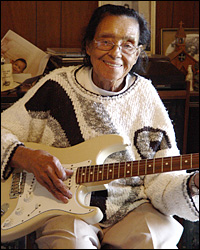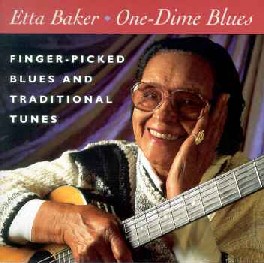If there’s one thing you should know about me it’s this; I drive my wife nuts … I’m always asking her about my articles. “What you think?” “Is this a good idea?” “How does it look?” After hearing me pontificate yet again, my wife TBBW gives me a steady gaze and says,

TBBW: Your articles are nice dear. They’re interesting … They have a good flow. (mockingly)…You need good flow. So it moves along fine … Has a nice pace … Then suddenly …They’re Dead! … Dead I tell ya!
TBB: …They’re not all dead … May I remind you it’s a reflective blog!
TBBW: That’s right and there’s plenty of women that play the blues that you haven’t even mentioned … Why don’t you do a little reflecting on Etta Baker? A woman who played great blues and made an impression on so many people …Of course she died of natural causes … (pause) But I forgot …your blog only features people who are either strangled or choke on something!
Sort of made me think …
ETTA BAKER
was born on March 31st 1913 in Caldwell County, North Carolina … She started to play guitar at the age of 3 and was taught by her father Boone Reid, who was also a long time player of the Blues.
Etta was just one of eight children. Often the clan would walk to neighbour’s houses to make music. Etta’s family was paid to play dances for businessmen and their families who would retreat at nearby cabins for leisure and entertainment on the weekends.
It wasn’t until 1956 that Etta gained notoriety when she appeared on a compilation album called “Traditional Music of the Southern Appalachians,” Her father had taken the family to nearby Cone Mansion. Folksinger Paul Clayton happened to be walking the grounds and Baker remembers,
“My daddy asked Paul to let me play One-Dime Blues. He was over the next day with his tape-recorder.”
—Etta Baker
These recordings would become some of the most influential sounds of the folk era. Etta’s renditions of “One-Dime Blues” and “Railroad Bill” became standards at the height of the folk music revival.
Clayton would bring his musician friends down from the New York folk scene to visit Etta. He brought Bob Dylan to visit Etta in 1962 to celebrate his 21st birthday. Dylan eventually rewrote Clayton’s song “Whose Going to Buy You Ribbons, When I’m Gone” into “Don’t Think Twice, It’s Alright.” This is where you can noticeably hear Etta’s guitar influence on Dylan.
Etta had abundant offers to perform but did not go because, her husband, who was a piano player, did not want to leave to travel out on the road. It is also believed that he was tremendously jealous and didn’t like the attention that Etta would receive when she performed.
Taj Mahal, a student in the early 60’s, was absolutely captivated by Baker. To Mahal she would be the greatest influence to his guitar playing. To this day he plays homage to her work, and has played and recorded with her several times.
“That chord in Railroad Bill is a very ancient root chord; it strikes straight through me, every time I hear it played.”
— Taj Mahal

The Piedmont Blues is a type of blues music that has a unique finger picking method on the guitar where alternating-thumb bass pattern supports a melody using treble strings. It gives the music an older ragtime feel. Etta was known as the foremost female Piedmont Blues guitar instrumentalist …
On September 25th of 2006 Etta Baker passed away at the age of 93 years young. Her influence has inspired so many artists in their own interpretations of the blues.
BACK AT HOME
Well I showed TBBW the above post. Nothing too lengthy… Just enough information to get a good sense of what Etta Baker was all about without getting too detailed. The video below explains more than I could ever write in one post… So, what do you think I asked TBBW? She looks at me with yet another exasperated gaze …
” Well that seems a little more upbeat… (more relaxed) See not everything you write needs to end with someone being mangled or eaten by wolverines … And finally you feature a woman in one of your posts … Great idea …”
—TBBW
During my research for this brief article I was trying to find more information on Etta’s early life. There is not much to be found. She is the only person I have ever read about that stayed at a factory job for over 50 years and only after that decided to pursue a music career full time. She released her first official CD “One-Dime Blues” in 1991 and “Railroad Bill” in 1999, and “Etta Baker with Taj Mahal” in 2004.
In 1989 Baker received the Folk Heritage Award from the North Carolina Arts Council. In addition she received a National Endowment for the Arts National Heritage Fellowship in 1991 and the North Carolina Award in 2003. Alongside with her sister, Cora Phillips, Baker received the North Carolina Folklore Society’s Brown-Hudson Folklore Award in 1982.
Etta Baker’s lifetime of music was tremendously inspired by her dad. She never stopped playing music! Which she did well into her nineties.

I’m laughing at your conversation with your wife. 🙂
Excellent post.
That was a real conversation we had… Now she has to put up with me quoting her in my blog. Poor TBBW!
What will The Blues Blogger do next? Quote his mother? … Wait a second … Hmmm …
What an absolute treat for a Sunday morning. I wish I had known this wonderful woman and had gotten to hear her play in person.
P.S. I like your wife’s style! LOL
Hi! I was surfing and found your blog post… nice! I love your blog. 🙂 Cheers! Sandra. R.